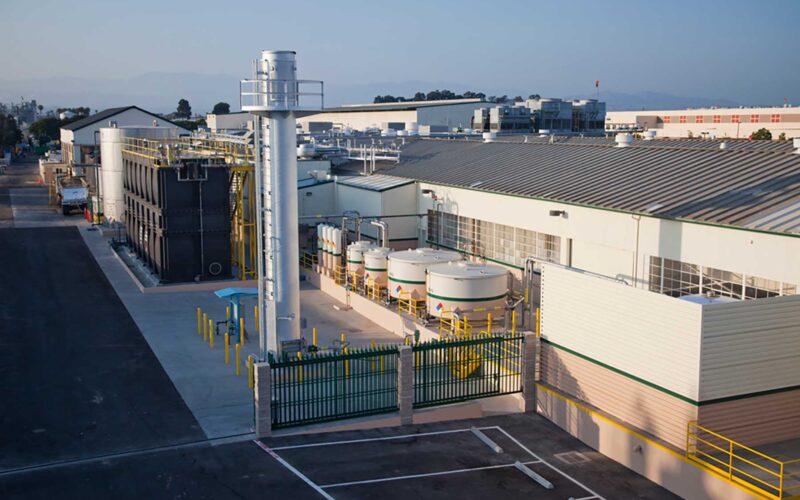When you spend your days peeling and processing onions, you know that waste is inevitable. But, at Gills Onions, we also know that sustainability is key to preserving our fields and the quality of our products for future generations.
Since Gills Onions began in 1983, we’ve passionately explored new technologies and methods to help us maximize conservation and efficiency in every area of our business.
Our mission is to be fully aware of the impact our business has on the environment and to hold ourselves accountable. We do this by continuously making and achieving measurable sustainability goals in each organizational and operational level of our business.
Our Zero Waste Facility
In 2009, Gills Onions made a goal to achieve zero waste company wide. We would work to maximize recycling, minimize waste, reduce consumption, and ensure that our products were made to be reused, repaired, or recycled back into nature or the marketplace.
This was an ambitious goal. In 2007, our home state of California sent 39.6 million tons of waste to landfills, 16% of which was food matter. At our own facility, about 37% of the onions processed cannot be used by customers and are discarded as waste along with leftover onion peelings.
In the past, we trucked this waste to the onion farms where it was worked back into the soil. But this practice wasn’t truly sustainable. It started proving problematic for soil conditions and cost $400,000 annually to transport the waste, not to mention the emissions caused by our trucking fleet.
We knew there had to be a better way to run our business — from the fields to the processing facility and even in our offices.
We began by creating a comprehensive inventory of all the waste streams in our business. We then developed strategies to help us move toward diverting 100 percent of our waste into productive outlets.
We track all of our resource usage from the types of fuel we use to electricity and water. We also keep a detailed inventory of greenhouse gas emissions and report it yearly to The Climate Registry.
At our processing facility, a wastewater treatment plant process 180,000 gallons of production wastewater per day. Ultimately, 100% of this water will be purified and recycled back to our facility for reuse. We’ve also increased the fuel efficiency of our entire fleet of trucks, saving 90 thousand gallons of fuel annually.
And by converting 99% of our conventional irrigation methods to drip irrigation, Gills Onions has reduced water consumption by 40%. That means we reduce the risks of soil erosion and conserve enough water each year to meet the annual needs of 2,900 households in our home state of California.
Through the implementation of wide-range recycling programs and the expansion of waste reduction initiatives, our company’s waste diversion reached 99.2% in 2018.
Converting Waste to Onion Power
A highlight of our zero waste efforts is Onion Power.
Our plant can process up to a million pounds of raw onions each day, creating an average of 150 tons of onion waste.
By collaborating with innovators across the United States over several years, Gills Onions was able to develop the Advanced Energy Recovery System (AERS), which converts onion waste into ultra-clean, virtually emissions-free electricity.
The AERS provides 100% of the base electrical load for our processing plant, the equivalent of enough power to supply 460 homes for an entire year. It also eliminates 14,500 tons of carbon dioxide equivalent emissions each year.
The Benefits of a Zero Waste Mindset
Working “green” positively impacts our employees, our customers, our industry, and our environment. It also benefits our bottom line.
We’ve been able to reduce operational costs, increase efficiency, improve our resource management, and create greater energy independence as we pursue a zero waste facility. And we aren’t the only ones who benefit.
Our customers see profit from a greener, less wasteful supply chain as well. They also enjoy increased transparency on how their onions are grown and processed and the impact those tasks have on the environment.
As Gills Onions has pursued zero waste initiatives, we’ve been able to share our expertise and innovations with fellow industry players and government bodies. Our technology has helped the state of California produce substantial quantities of combined power and heat from renewable food processing waste products. Widespread use of “waste-to-energy” conversion technology is replacing significant amounts of electricity and natural gas use statewide.
The real winner in our sustainability journey is — of course — our environment. We’ve reduced greenhouse gas emissions by no longer hauling waste off-site for composting. We’ve also improved air quality by reducing the use of conventional fuel supplies and replacing other polluting energy sources with clean alternatives.
By demonstrating responsibility and leadership, we hope to encourage environmentally-friendly, waste-reducing initiatives in our nation and in our industry.
Ready to try onions grown “The Gills Way”? Contact our sales department to learn more.

